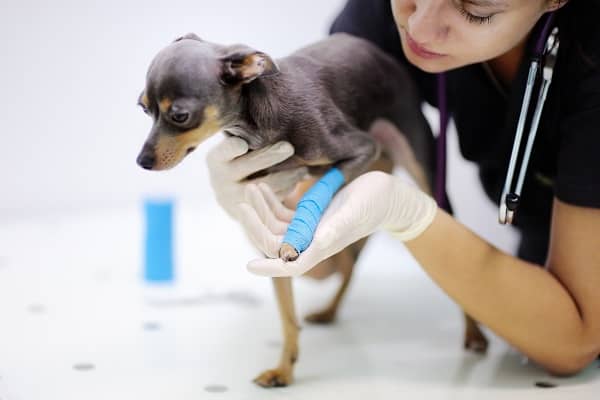Becoming a veterinary technician is one of the most rewarding career options in veterinary sciences. Choosing from the best colleges for vet tech is crucial for credentialing and your learning and development. This article will provide a list of the best on-campus and online vet tech programs.
With that, graduates can expect excellent employment prospects immediately upon graduation.
If you love animals and intend to make a career as a vet tech, you’ll need licensure. Most states require you to pass the Veterinary Technician National Examination (VTNE), offered by the American Association of Veterinary State Boards.
Completing your formal veterinary technician education from American Veterinary Medical Association (AVMA) accredited vet tech schools can help you prepare for VTNE.
A vet tech program ranges from a two-year veterinary technician associate degree to the four-year bachelor of science in veterinary tech. You can choose either of the two depending on the amount of time you want to invest in your education as well as your career aspirations.
Table of Contents
Top Vet Tech Colleges
-
Interested in becoming a Vet Tech? Apply today!
Loading…
/**/
We have divided this list into two parts: the best on-campus and online programs. Some schools offer you both options. Please note that we’ve not created this list based on any specific metrics or ranking criteria, and because careers in veterinary technology take different forms, the top schools listed below are ranked in no particular order.
Now, let’s take a look at top schools that offer on-campus vet tech programs.
On-Campus Program Options
An on-campus veterinary technician program generally consists of full-time classes, laboratory procedures, and practicum hours. Attending an on-campus vet tech degree gives you the option to finish the program at an accelerated pace. You also get daily access to the college infrastructure and can interact with peers easily.
1. New England Institute of Technology, East Greenwich, Rhode Island
The New England Institute of Technology offers a comprehensive veterinary technician associate degree and a bachelor of science in vet tech. Our top-notch curriculum helps you prepare for the Veterinary Technician National Exam.
The Associate of Science degree in Veterinary Tech has received full accreditation from the American Veterinary Medical Association (AVMA) to educate veterinary technicians. You can continue to the Bachelor of Science in Veterinary Tech degree, the final six terms of the institute’s 2+2 vet tech program.
New England Tech is one of the few colleges that give you the flexibility to choose between on-campus and online classes.
With our accelerated online program, you can prepare for entry-level positions as animal care professionals, vet technicians, veterinary technologists, and more in 18 months! Those enrolled at our institute are also eligible for financial aid and scholarships.
START YOUR VETERINARY TECHNOLOGY CAREER Earn your degree in Veterinary Technology from NEIT and begin your new career path today! ASSOCIATE'S DEGREE BACHELOR'S DEGREE

Source: Unigo
2. Purdue University, West Lafayette, Indiana
Purdue is one of the largest public land-grant universities in the country. Students can choose from a veterinary technician associate or bachelor’s degree.
Purdue University also offers a distance learning option, where students can attend online classes. Students must complete their clinical mentorship. However, distance-learning students already employed in the field can meet their clinical requirements at a local veterinary clinic near their place of employment.

Source: Purdue University
3. Mercy College, Manhattan, New York
Mercy College offers a unique four-year Bachelor of Science in Veterinary Technology. The first two years of the program focus on academic coursework, which introduces students to animal anatomy, small animal internal medicine, veterinary medicine, diagnostic imaging, veterinary practices, etc.
After fulfilling all theory requirements, students can complete extensive clinical training that includes two full-semester externships at veterinary clinics and hospitals.
Students can complete their degree at their own pace, taking as little as one course per semester.

Source: Mercy College
4. Crowder College, Neosho, Missouri
The American Veterinary Medical Association (AVMA)-accredited Associate in Applied Science degree at Crowder includes a 78-credit hour curriculum. Upon successful completion of your veterinary technician associate degree, you can sit for the AVMA credentialing exam. The state of Missouri also makes it mandatory to pass a state-level exam.
The institute has excellent facilities on campus for prospective vet techs, such as barns, dog kennel, x-ray lab, and over 300 acres of farmland. However, there are only 18 seats per year for the veterinary technician program at Crowder College.

Source: Google Street View
5. Morehead State University, Morehead, Kentucky
Morehead State University offers a Bachelor of Science in Veterinary Technology and an associate degree which you can earn in as little as three years. Students enrolled in these veterinary technician programs get hands-on experience at the University’s Small Animal Teaching Hospital and the Equine Health and Education Center.
After obtaining your degree and vet tech certification, you can offer support services at private veterinary clinics, government regulatory agencies, zoo/wildlife, biomedical research, and academics.

Source: Morehead State University
6. Blue Ridge Community College, Weyers Cave, Virginia
Blue Ridge offers prospective veterinary technology students two options: a two-year full-time associate’s degree at Weyers Cave campus or a three-year part-time distance education program.
Both programs have received full accreditation, so you’ll be eligible to take the VTNE exam regardless of which one you choose.
The part-time program is well-suited for an individual already working as a veterinary assistant. Classes meet twice a week, and students must come to the BRCC campus three times per semester for laboratories.

Source: Blue Ridge Community College
7. Portland Community College, Portland, Oregon
Portland Community College offers the only program in Oregon for aspiring vet techs. The college provides a healthy learning environment to gain the hands-on experience to work as veterinary health care professionals.
The institute’s graduate veterinary technicians perform exceptionally well in the VTNE exam. More than 98 percent of the school’s students pass the national credentialing exam.
Best Online Vet Tech Schools
Individuals working as veterinary assistants or passionate about treating sick or injured animals but can’t commute can enroll in an online learning program.
However, most online schools require you to acquire practical skills through clinical externships. Every vet tech student must complete a fixed number of clinical hours as a part of their course requirements.
1. Penn Foster, Scottsdale, Arizona
Penn Foster has partnered with prominent veterinary hospital chains such as Banfield and VCA Animal Hospitals, where students can complete their veterinary practice externship.
The entire course consists of visual learning aids and interactive assessments to introduce students to medical terminology, animals’ integumentary, urinary, and endocrine systems, caring for large and small animals, animal medicine, nutrition, and laboratory hours.

2. San Juan College, Farmington, New Mexico
San Juan College offers a highly flexible AVMA-accredited online veterinary technology program. The classes start in January, May, and August, and students can join either of the three programs. The vet tech degree constitutes four levels of courses, and you will require about 12 weeks to complete each level.
After completing the first level, each student must complete their practicum hours at a vet clinic or hospital to register for the second, third, and fourth levels.
Graduate vet techs from their veterinary technician program are eligible for the VTNE in any state.

Source: San Juan College
3. Jefferson State Community College, Birmingham, Alabama
Jefferson State Community College provides an online, distance veterinary nursing program. The course includes subjects like Anesthesiology, Radiology, Laboratory Procedures, EKGs, Dental Procedures, Emergency, First Aid Care, Nutrition, Record Keeping, and Client Communication.
Students can also travel to Birmingham about two times per semester to fulfill their clinical requirements at Jefferson State or any other clinic in Alabama. The institute gives you the flexibility to complete your midterm and final exams at any testing center across the state.
4. St. Petersburg College, St. Petersburg, Florida
The A.S. Degree at St. Petersburg College gives you the option to attend classes online and complete your clinical practicums where you reside.
Every student in their veterinary technician programs must complete 280 hours of clinical experience in a veterinary facility per semester enrolled in the program. Completing your associate’s degree can help you prepare for the national certification exam and transfer to the college’s Bachelors of Applied Science in Vet Tech.

5. Colby Community College, Colby, Kansas
Colby Community College offers excellent on-campus and online veterinary nursing programs. Students can complete their online courses from home. They must gain hands-on experience at a veterinary clinic or hospital near them from the second term to fulfill the AVMA guidelines.
These mentorships are highly beneficial for individuals who do not have those species in their area. Mentorship courses will require access to a video camcorder and tripod when recording hands-on AVMA essential skills.

Source: Colby Community College
Vet Tech Programs and Certification
A bachelor’s degree can also help you pursue advanced roles in academics and research.
Apart from getting familiar with vet tech schools and community college programs, you must also understand licensing requirements in the vet tech profession.
Goals and Courses of Vet Tech Programs
The primary goal of any veterinary technician education is to gain the knowledge and skills necessary to work as a veterinary technician or technologist.
Graduates must also gain proficiency in verbal and written communication, nursing, pharmacology, anesthetics, and computers. During their studies, individuals must complete classes in anatomy, physiology, and chemistry.
The general education core prepares students for the professional world and helps them acquire skills for carrying out their routine activities. All vet technician schools ensure students complete their practicum hours to gain a hands-on understanding of their subject.
Benefits of Veterinary Technician Education
A formal degree in vet tech offers several advantages, such as:
- Excellent job prospects
- Decent salary
- Lifelong learning
- Knowledge of biology, radiology, nursing, anesthesia, etc.
- Skill development
- Career satisfaction
- Flexible working hours
Certifications and Licensure for Veterinary Technicians
The best vet tech schools receive their accreditation from credible organizations such as the American Veterinary Medical Association for educating veterinary technicians. Typically, every veterinary school offers programs that lead to an associate’s or bachelor’s degree.
Obtaining your degree helps fulfill the minimum eligibility criteria to appear for the VTNE exam.
The three standard certifications for veterinary science professionals are:
Veterinary Technician National Examination (VTNE)
The VTNE certification is generally the minimum requirement for practice as a vet tech in most states. AAVSB conducts the VTNE exam thrice per year. You must complete an approved vet tech degree such as the associate of science in vet tech to apply for the exam.
Approved Veterinary Assistant (AVA) Examination
The National Association of Veterinary Technicians in America (NAVTA) offers the AVA exam for individuals that plan to become approved veterinary assistants. Eligibility criteria include completing your formal education from a NAVTA-approved institute.
American Veterinary Medical Association Approved Certification
The American Board of Veterinary Practitioners (ABVP) is an AVMA-recognized body that certifies veterinarians in 11 specialty areas. This exam qualifies graduates to work as veterinarians, and professional veterinarians must submit proof of their formal veterinary education to sit for the exam.
Conclusion
Every individual must obtain their certificate and licensure to practice as a vet tech. An associate’s degree is the minimum eligibility requirement to sit for the national certification exam.
A formal degree in vet tech can unearth many rewarding career paths. Along with excellent employment prospects, veterinary technician programs also help students gain lifelong skills that distinguish them as thorough professionals in their field.
START YOUR VETERINARY TECHNOLOGY CAREER Earn your degree in Veterinary Technology from NEIT and begin your new career path today! ASSOCIATE'S DEGREE BACHELOR'S DEGREE
FAQs
What Should I Major in to Be a Vet Tech?
A two-year associate’s degree in veterinary technology can lead you to a career as a veterinary technician, while a four-year bachelor’s degree helps you become a veterinary technologist.
Is Becoming a Vet Tech Worth It?
The jobs for vet techs will continue to increase rapidly, which means becoming a vet tech is worth the effort. The BLS predicts that the employment of veterinary technicians and technologists will grow at a faster-than-average rate of 15 percent, adding about 17,100 new jobs in the next ten years.
That statistic infers excellent employment prospects immediately upon graduation.
What Is the Best State to Be a Vet Tech?
The District of Columbia offers the highest average salary of $66,850 to veterinary technologists and technicians. Connecticut, California, Nevada, and Massachusetts also offer excellent wages. Meanwhile, Texas has the highest employment levels for vet techs, followed by Florida, California, Pennsylvania, and New York.


